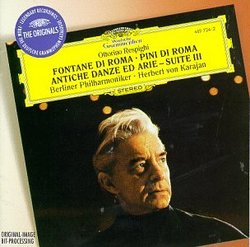| All Artists: Ottorino Respighi, Luigi Boccherini, Tomaso Albinoni, Herbert von Karajan, Berlin Philharmonic Orchestra, Wolfgang Meyer, Wolfgang Sebastian Meyer Title: Respighi: Fontane di Roma, Pini di Roma, etc / Karajan Members Wishing: 0 Total Copies: 0 Label: Deutsche Grammophon Release Date: 5/13/1997 Genre: Classical Styles: Chamber Music, Forms & Genres, Theatrical, Incidental & Program Music, Historical Periods, Baroque (c.1600-1750), Classical (c.1770-1830), Modern, 20th, & 21st Century Number of Discs: 1 SwapaCD Credits: 1 UPC: 028944972429 |
Search - Ottorino Respighi, Luigi Boccherini, Tomaso Albinoni :: Respighi: Fontane di Roma, Pini di Roma, etc / Karajan
 | Ottorino Respighi, Luigi Boccherini, Tomaso Albinoni Respighi: Fontane di Roma, Pini di Roma, etc / Karajan Genre: Classical
|
Larger Image |
CD Details |
CD ReviewsThe Best I've Ever Heard! Shyam Narotam | Tulsa, OK USA | 11/14/2000 (5 out of 5 stars) "I would have to say that "Pines of Rome" is one of, if not my favorite orchestral peices ever composed! I happened to come by this recording by Karajan by accident, and i've never regretted it since. It is, by far, the best recording I have heard of Resphighi's masterpeice to date. There is a depth to the sonority of the sound that is not heard in many other recordings, and as always, Karajan seems to know exactly what the composer had envisioned the peice[s] to sound like. The tempos, dynamics, and overall interpretation of the peices seem to be perfect in execution. Combine that with the masterfull playing and technique of the world-class ensemble of the Berlin Philharmonic, and you have a combination of pure perfection. I also liked the "Fountains of Rome" recording of this CD, it being of the same high quality and sound as "Pines". My only qualms with this recording is the amount of ambient noises that can be heard throughout the recording. Whether it be what sounds like a dropped bow by a string player, or a chair being moved, or a floorboard creaking, these sounds can clearly be heard. HOWEVER, one soon forgets these minor inconveniences once the orchestra starts to play the peices, and the greatness of the technique and sound can be heard (combined with the melodious genius of Respighi). This is a definite must have for all Respighi fans." A Great Compilation C. Sligh | Winston-Salem, NC United States | 04/17/2006 (5 out of 5 stars) "If I could choose the 10 best classical albums, this would be one of them. The Boccherini is probably the best part, and sections of it were used in several movies, including Sherlock Holmes: The Case of The Silk Stocking and Master and Commander: The Far Side of The World. The quality of the recording is crystal clear, creating the most enjoyable listening experience. It finishes off with Albinoni and the fabulous Adagio in G Minor, featuring Wolfgang Meyer on the organ. All in all, it's a very nice album, and a joy to listen to." Fantastic! Blue Hose Bone 311 | South Carolina | 02/05/2007 (5 out of 5 stars) "I love the Pines of Rome and find this version to be the next best after my other benchmark, Reiner's interpretation with the Chicago Symphony in the 60's. Too many conductors feel the need for excessive speed in the opening of this piece, causing it to feel hurried and rushed rather than triumphant. Karjan and Reiner are able to reign in this tendency. The playing is immaculate as well. This is an essential recording of this piece. Buy it."
|

 Track Listings (18) - Disc #1
Track Listings (18) - Disc #1